DAM, CMS and DXP are three different types of management systems that are used to create, store and deliver content in companies that use large amounts of digital content. Is your media agency expanding? Are you in the business of creating marketing materials? Are you making videos or perhaps building global recognition for your brand?
What are CMS, DAM, DXP systems used – table of contents:
See how artificial intelligence can help you manage content at scale and what are CMS, DAM, DXP systems used for?
Artificial intelligence in Digital Asset Management (DAM) system
In an increasing number of companies, multimedia resources play a key role. This makes digital asset management systems, such as DAM, increasingly popular. However, before we move on to discuss the role of artificial intelligence in DAM, it is worth understanding what these systems are.
What is a DAM?
A DAM (Digital Asset Management) system is a centralized system to manage a company’s digital assets, such as photos, videos, audio files and documents.
In other words, it’s an application or program with which a company can organize and conveniently deliver its text and multimedia content for publication in any digital distribution channel.
What is the role of AI in DAM?
In DAM, each item is given its place as soon as it is created – it is given the appropriate metadata, or tags, which track it in the database and link to other materials on the same topic or developed in a similar form. Equipped with textual understanding (NLP) and image recognition, AI can therefore help to automatically and very accurately tag, classify, sort, and search digital assets based on their content and metadata.
Artificial intelligence can help generate a content base by recognizing content types and automatically creating metadata, for example, through video transcription or image processing. Its help is also invaluable in creating collections of content centered around similar topics, sometimes commonalities that a human would not think of.
Artificial intelligence can also facilitate the daily management of the existing base. It is the action of AI that will provide relevant prompts containing similar content. Analyzing the frequency of particular materials and their impact on brand image, also provides valuable insights into their effectiveness.
3 popular DAMs supported by artificial intelligence
Among the software to manage digital assets, it is worth noting:
- Bynder – a DAM solution that enables exceptional content experiences at scale. Designed for companies that want to easily manage and share content across multiple channels, Bynder employs artificial intelligence to automate content management processes and facilitate search. Its strengths are its advanced technology and simplicity, while its distinguishing feature is the ability to create custom templates and automate content creation processes.
- Brandfolder – a DAM known for its ease of use and is best for companies that want to implement such a solution quickly. Brandfolder harnesses artificial intelligence to automate content management processes and facilitate search. Its strengths are its intuitive user interface and wide range of features. Its distinguishing feature is the ability to integrate with other marketing tools.
- MediaValet – DAM software designed for marketing and creative teams. It is best for companies that want to swiftly manage content throughout the campaign lifecycle. MediaValet employs artificial intelligence to automate content management processes and facilitate search. Its strength is its rich integration with other marketing tools.
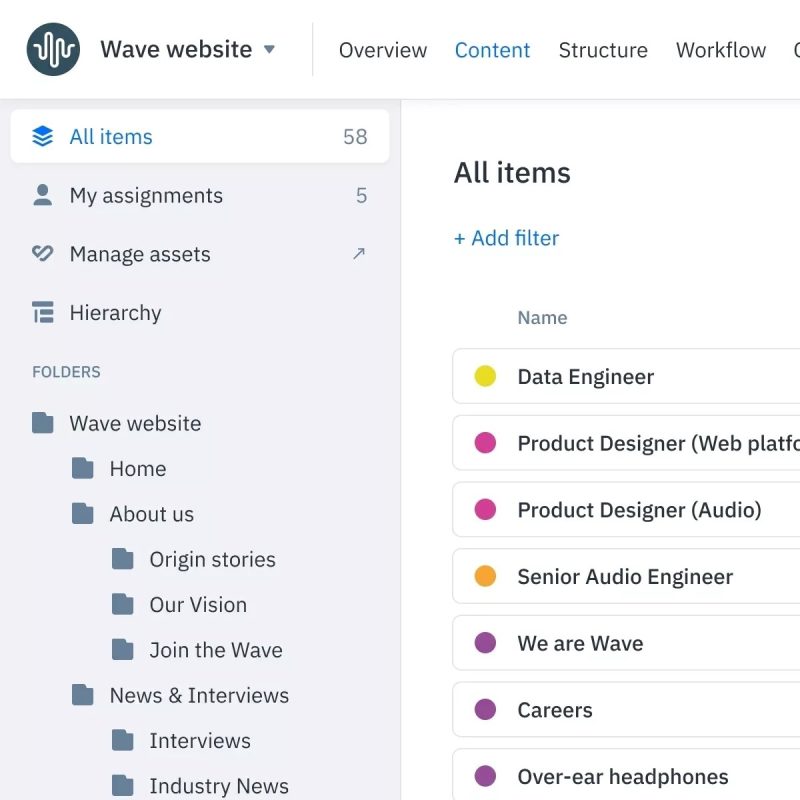
Bynder, Digital Asset Management
Source: bynder.com
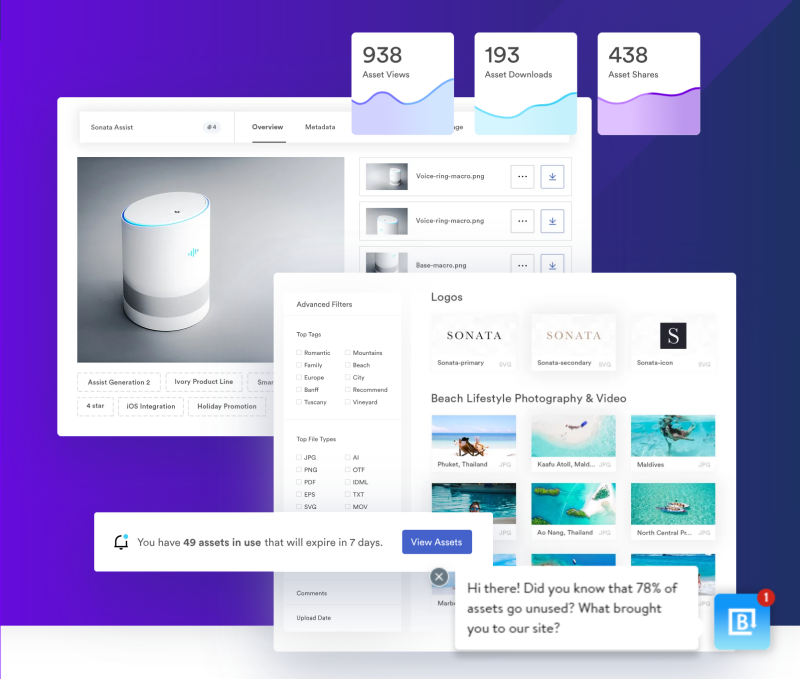
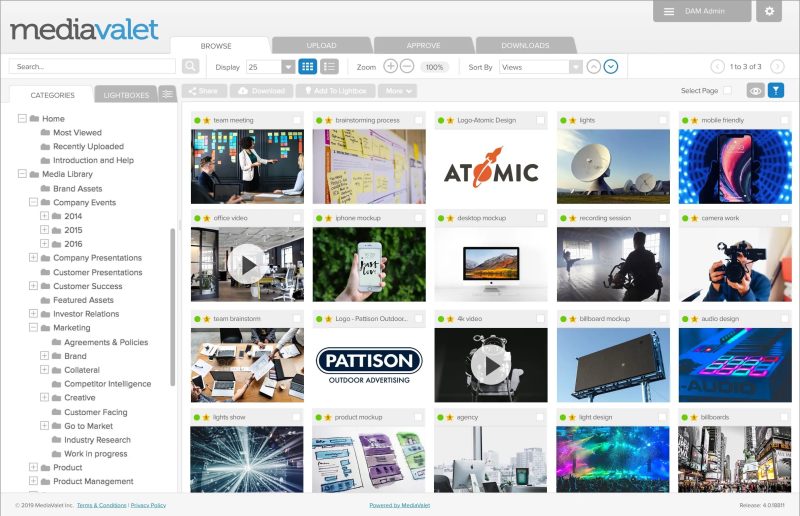
MediaValet, Digital Asset Management
Source: mediavalet.com
Content Management System, or CMS
Unlike DAM, which is primarily applied to organize and structure the content base, CMS (Content Management System) is a system that allows you to create and modify content for websites, blogs, social networks and other digital media.
What is a CMS (Content Management System)?
A CMS can organize the content of a web portal, e-commerce, or even internal company materials. However, the vast majority of popular CMSs are WCMSs – that is, systems used to support websites.
What are the benefits of AI in CMS?
In CMS, AI can help generate and optimize content based on data about users, their preferences and behaviors. Among other things, AI can be used to handle areas such as:
- Personalization – for example, displaying generated content that takes into account the user’s profile,
- Dynamic pricing of products – for example, an AI-supported CMS can display different prices depending on a user’s purchase history,
- Selection of language version and automatic translation of the site – depending on the location of the user.
For popular WCMSs such as WordPress and WooCommerce, AI-enabled tools are available in the form of plug-ins.
3 popular CMS supported by AI
Three examples of well-known CMSs with AI support are:
- Contentstack – a headless CMS in which we will prepare content for display on various devices, with no preference for a single channel. It has an integrated editor supported by AI. It offers ready integrations with IBM Watson, Salesforce Einstein and MonkeyLearn, enabling clients to use AI to create personalized content.
- Joomla – an open-source CMS that offers a range of AI-supported extensions to enhance its capabilities. It stands out for its rich extensions and ease of use, making it a good choice for companies that want to quickly implement a CMS solution.
- WordPress – this very popular open-source CMS, which offers a wide range of AI-supported plugins. It has the advantage of a huge community of users and developers and easy integration with other tools.
- Hostinger AI Assistant – a free plug-in for generating text content with the help of AI,
- Divi AI – a suite of AI-supported WordPress tools, available both as a theme and as a plugin. Enables you to generate text and images through internal modules,
- AI Engine – a plug-in that helps optimize a website for search engines and improve its performance.
Among others, you can use:
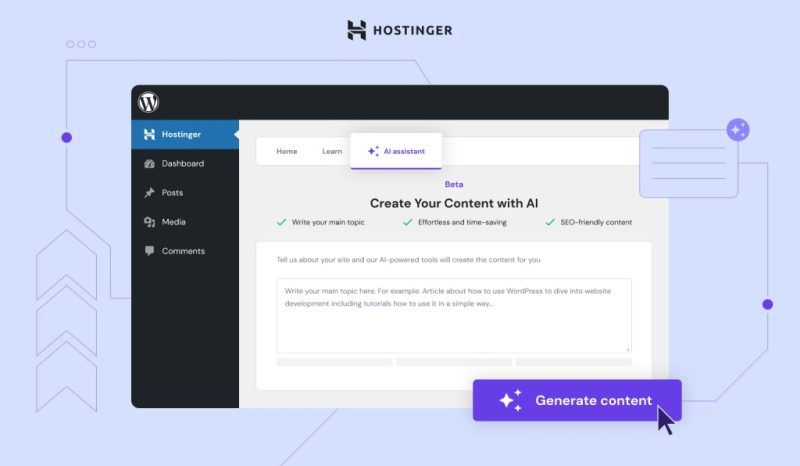
WordPress plugin Hostinger AI Assistant.
Source: hostinger.com
Digital Experience Platform (DXP)
The most modern and extensive integrated way to manage content aided by artificial intelligence is the Digital Experience Platform (DXP). It puts at the center not the content, but the user experience to be created. This is because it serves to centralize all the digital channels of the company.
What is DXP (Digital Experience Platform)?
DXP (Digital Experience Platform) is a system that integrates various functions of CMS, DAM and other tools to provide consistent and personalized digital experiences for users across channels and devices.
What is the AI in DXP used for?
In DXP, AI can help customize content and interactions to meet individual user needs and goals, as well as analyze and measure the effectiveness of digital experiences. DXP’s key AI-enabled features include:
- Matching content to device requirements – to make the experience smooth enough, AI will decide whether to adjust font and image size and even choose whether to display a certain type of content at all,
- Personalization of content – that is, identification of the user, selection and presentation of content tailored to their needs and preferences, for instance, based on previous behavior,
- Measuring areas of user activity on the site – which content interested the reader and was clicked on.
3 DXP tools using artificial intelligence
Examples of DXP platforms supported by AI include:
- Quintype – an AI-backed digital experience platform that enables news and media publishers to generate, distribute and monetize their content. It is designed primarily for media companies that want to easily manage and deliver their content to various platforms. One of the reasons to choose Quintype is its rich integrations with other tools and platforms, making it easy to manage content throughout the publication lifecycle.
- Sitecore – DXP, which applies artificial intelligence to automatically personalize content and deliver hyper-relevant search results. Designed for companies that want to integrate their marketing efforts and deliver personalized digital experiences to their customers. One of the solutions Sitecore is known for is its advanced personalization technology to customize content for individual users.
- Adobe Experience Manager Assets – a well-established DXP solution that employs artificial intelligence to automate content management processes and facilitate search. It is designed for companies that want to integrate their marketing efforts with other Adobe products, such as Photoshop, InDesign and Illustrator. This integration makes the workflow seamless throughout the creative process. Adobe Experience Manager Assets is the tool that takes the most from artificial intelligence capabilities given its deep integration with generative AI, thanks to which:
- Photoshop allows for generative fill, which is the completion of images using text cues,
- Illustrator lets you apply brand colors to any design (Generative Recolor)
- Adobe Express gives you the ability to quickly generate text clues and fill letters or words with texture.
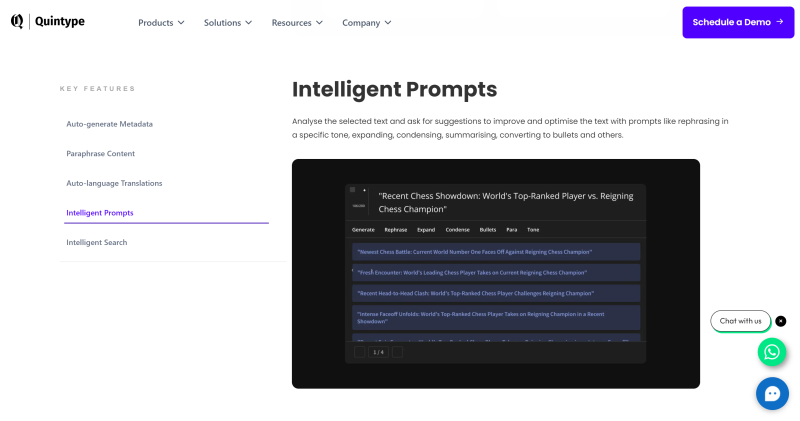
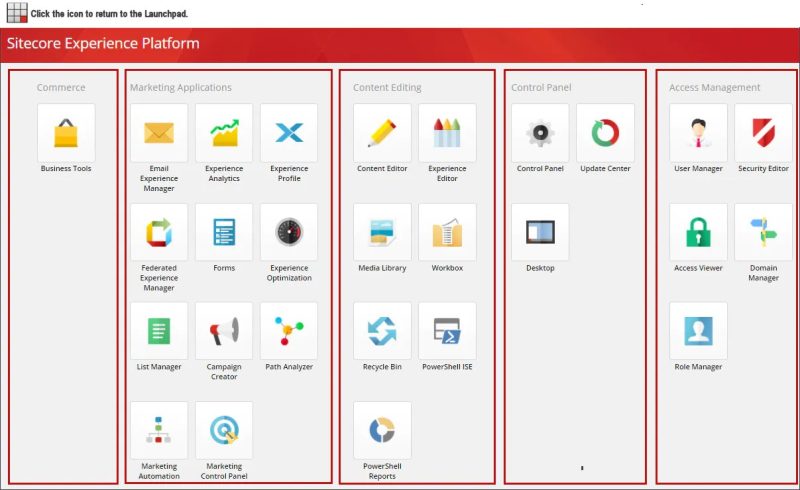
Sitecore, Digital Experience Platform (DXP)
Source: doc.sitecore.com
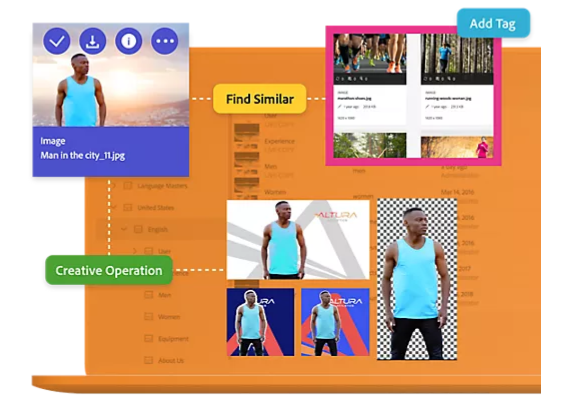
Adobe Experience Manager Assets
Source: adobe.com
Summary
Artificial intelligence is playing an increasingly important role in managing corporate content. The larger the content base, number of customers and distribution channels, the more handy AI capabilities become in organizing and publishing content. It also helps to identify valuable content, which is increasingly important for search engine optimization. Both DAM, CMS and DXP feature AI models to analyze, classify and present content. Consider which solution will be optimal for your business – DAM to manage your content database, CMS to help publish it, or rather DXP, where you combine DAM and CMS functions with concern for the overall user experience.

Both solutions belonging to the DAM, CMS and DXP groups take a pointwise approach in employing artificial intelligence models for analytical purposes by drawing inspiration from hints and methods of organizing content according to complex, semantic metadata. Still, our AI-based systems already capable of creating content on their own by learning from the content databases they organize? We will take on that issue in our following articles.
If you like our content, join our busy bees community on Facebook, Twitter, LinkedIn, Instagram, YouTube, Pinterest.
Author: Robert Whitney
JavaScript expert and instructor who coaches IT departments. His main goal is to up-level team productivity by teaching others how to effectively cooperate while coding.
AI in business:
- Threats and opportunities of AI in business (part 1)
- Threats and opportunities of AI in business (part 2)
- AI applications in business - overview
- AI-assisted text chatbots
- Business NLP today and tomorrow
- The role of AI in business decision-making
- Scheduling social media posts. How can AI help?
- Automated social media posts
- New services and products operating with AI
- What are the weaknesses of my business idea? A brainstorming session with ChatGPT
- Using ChatGPT in business
- Synthetic actors. Top 3 AI video generators
- 3 useful AI graphic design tools. Generative AI in business
- 3 awesome AI writers you must try out today
- Exploring the power of AI in music creation
- Navigating new business opportunities with ChatGPT-4
- AI tools for the manager
- 6 awesome ChatGTP plugins that will make your life easier
- 3 grafików AI. Generatywna sztuczna inteligencja dla biznesu
- What is the future of AI according to McKinsey Global Institute?
- Artificial intelligence in business - Introduction
- What is NLP, or natural language processing in business
- Automatic document processing
- Google Translate vs DeepL. 5 applications of machine translation for business
- The operation and business applications of voicebots
- Virtual assistant technology, or how to talk to AI?
- What is Business Intelligence?
- Will artificial intelligence replace business analysts?
- How can artificial intelligence help with BPM?
- AI and social media – what do they say about us?
- Artificial intelligence in content management
- Creative AI of today and tomorrow
- Multimodal AI and its applications in business
- New interactions. How is AI changing the way we operate devices?
- RPA and APIs in a digital company
- The future job market and upcoming professions
- AI in EdTech. 3 examples of companies that used the potential of artificial intelligence
- Artificial intelligence and the environment. 3 AI solutions to help you build a sustainable business
- AI content detectors. Are they worth it?
- ChatGPT vs Bard vs Bing. Which AI chatbot is leading the race?
- Is chatbot AI a competitor to Google search?
- Effective ChatGPT Prompts for HR and Recruitment
- Prompt engineering. What does a prompt engineer do?
- AI Mockup generator. Top 4 tools
- AI and what else? Top technology trends for business in 2024
- AI and business ethics. Why you should invest in ethical solutions
- Meta AI. What should you know about Facebook and Instagram's AI-supported features?
- AI regulation. What do you need to know as an entrepreneur?
- 5 new uses of AI in business
- AI products and projects - how are they different from others?
- AI-assisted process automation. Where to start?
- How do you match an AI solution to a business problem?
- AI as an expert on your team
- AI team vs. division of roles
- How to choose a career field in AI?
- Is it always worth it to add artificial intelligence to the product development process?
- AI in HR: How recruitment automation affects HR and team development
- 6 most interesting AI tools in 2023
- 6 biggest business mishaps caused by AI
- What is the company's AI maturity analysis?
- AI for B2B personalization
- ChatGPT use cases. 18 examples of how to improve your business with ChatGPT in 2024
- Microlearning. A quick way to get new skills
- The most interesting AI implementations in companies in 2024
- What do artificial intelligence specialists do?
- What challenges does the AI project bring?
- Top 8 AI tools for business in 2024
- AI in CRM. What does AI change in CRM tools?
- The UE AI Act. How does Europe regulate the use of artificial intelligence
- Sora. How will realistic videos from OpenAI change business?
- Top 7 AI website builders
- No-code tools and AI innovations
- How much does using AI increase the productivity of your team?
- How to use ChatGTP for market research?
- How to broaden the reach of your AI marketing campaign?
- "We are all developers". How can citizen developers help your company?
- AI in transportation and logistics
- What business pain points can AI fix?
- Artificial intelligence in the media
- AI in banking and finance. Stripe, Monzo, and Grab
- AI in the travel industry
- How AI is fostering the birth of new technologies
- The revolution of AI in social media
- AI in e-commerce. Overview of global leaders
- Top 4 AI image creation tools
- Top 5 AI tools for data analysis
- AI strategy in your company - how to build it?
- Best AI courses – 6 awesome recommendations
- Optimizing social media listening with AI tools
- IoT + AI, or how to reduce energy costs in a company
- AI in logistics. 5 best tools
- GPT Store – an overview of the most interesting GPTs for business
- LLM, GPT, RAG... What do AI acronyms mean?
- AI robots – the future or present of business?
- What is the cost of implementing AI in a company?
- How can AI help in a freelancer’s career?
- Automating work and increasing productivity. A guide to AI for freelancers
- AI for startups – best tools
- Building a website with AI
- OpenAI, Midjourney, Anthropic, Hugging Face. Who is who in the world of AI?
- Eleven Labs and what else? The most promising AI startups
- Synthetic data and its importance for the development of your business
- Top AI search engines. Where to look for AI tools?
- Video AI. The latest AI video generators
- AI for managers. How AI can make your job easier
- What’s new in Google Gemini? Everything you need to know
- AI in Poland. Companies, meetings, and conferences
- AI calendar. How to optimize your time in a company?
- AI and the future of work. How to prepare your business for change?
- AI voice cloning for business. How to create personalized voice messages with AI?
- Fact-checking and AI hallucinations
- AI in recruitment – developing recruitment materials step-by-step
- Midjourney v6. Innovations in AI image generation
- AI in SMEs. How can SMEs compete with giants using AI?
- How is AI changing influencer marketing?
- Is AI really a threat to developers? Devin and Microsoft AutoDev
- AI chatbots for e-commerce. Case studies
- Best AI chatbots for ecommerce. Platforms
- How to stay on top of what's going on in the AI world?
- Taming AI. How to take the first steps to apply AI in your business?
- Perplexity, Bing Copilot, or You.com? Comparing AI search engines
- ReALM. A groundbreaking language model from Apple?
- AI experts in Poland
- Google Genie — a generative AI model that creates fully interactive worlds from images
- Automation or augmentation? Two approaches to AI in a company
- LLMOps, or how to effectively manage language models in an organization
- AI video generation. New horizons in video content production for businesses
- Best AI transcription tools. How to transform long recordings into concise summaries?
- Sentiment analysis with AI. How does it help drive change in business?
- The role of AI in content moderation


















